[新版]pep六年级英语时态.ppt
合集下载
六年级下册英语-小升初总复习-时态全解-人教版PEP(共29张PPT)
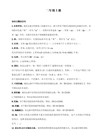
将来时理论
一、 概念:表示将要发生的动作或存在的状态及打算、 计划或准备做某事。 句中一般有以下时间状语: tomorrow, next day(week, month, year…),
soon, the day after tomorrow(后天) this morning , this afternoon , this evening等。
试题演练:
三、 选择正确的答案。 B presents for my parents yesterday. 1. I ____ A. buyed B. bought C. buying C 2. Susan _____ swimming yesterday. A. go B. goes C. went B 3. Danny _____ breakfast five times last week. A. eat B. ate C. eated C Tree Planting Day. 4. Last Sunday____ A. is B. were C. was
试题演练:
一、写出下列动词的过去式或动词原形。 went was 1. go_______ 2. is___________ Lorem ipsum dolor bought 3.buy_______ 5. have had ____
sit amet, consectetur adipisicing elit, sed do eiusmod tempor incididunt ut labore
swam 4.swim__________
6. watched watch _____
eat 7. ate______
get 8. got__________
人教PEP版六年级下册英语四大时态总复习课件

2.行为动词的变化。 否定句:主语+don't(doesn't)+动词原形(+其他). 如:I don't like fast food.我不喜欢快餐。 注意:当主语为第三人称单数时,要用doesn't构成否定句。 如:He doesn't go to school on the weekend. 他周末不上学。 —般疑问句:Do(Does)+主语+(其他+)动词原形+其他? 如:—Do you often play basketball?你经常打篮球吗? —Yes,I do./No,I don't.是的,我经常打。/不,我不经常打。
6.I __h_a_v_e___(have)a fever and my nose hurts. 7.Jim is good at P.E.He gets up early and __d_o_e_s___(do)some sports every morning. 8.Tom ___is__g_o_i_n_g__t_o_/_w_i_l_l _g_o_(go)to plant trees next day.He _g_o_e_s____(go)to plant trees every year. 9.My father __l_ik_e_s___(like)__p_la__y_in_g____(play)baseball. 10.Yesterday the teacher told us the earth _g__o_e_s___(go)round the sun.
6.I'm ____d_r_a_w_i_n_g______(draw)a picture. 7.Yang Ling's hobby is ____m__a_k_i_n_g______(make)cakes. 8.Yang Ling __i_s_w__a_i_ti_n_g______(wait)for the bus now. 9.Look!Linda ____i_s_s_i_t_ti_n_g_____(sit)on the rock and ____li_s_t_e_n_i_n_g_____(listen)to the music. 10.You are ___p__la_y_i_n_g_______(play)with dolls.
英语人教版六年级下册一般过去时态课件
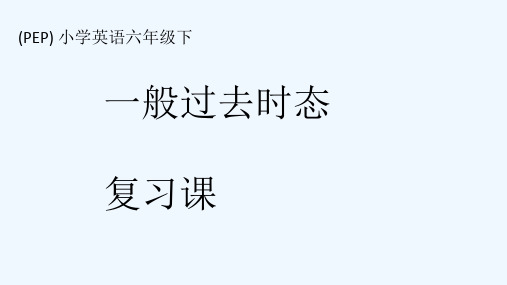
the day before yesterday
read a book, did her homework last night cleaned her room, washed her clothes last summer holiday
Sarah
Look, ask and answer
went to a park
Look, ask and answer
by plane
Look, ask and answer
read a book
Look, ask and answer
took a trip
Look, ask and answer
weekend
一般过去时态几个常用的表达句型:
1. 询问别人的周末过得怎么样:How was your weekend? 答语:It was good./great/ all right/OK / fine .
(PEP) 小学英语六年级下
一般过去时态
复习课
Where did you go on your holiday? We went to Canada on our holiday. How did you go on your holiday? We went by plan on our holiday. What did you do on your holiday? We skied and made a snowman on our holiday. Did you have a good time on your holiday? We had a lot of fun on our holiday.
5.Mike didn’t go (not go)to a park last Saturday.
时态之一般现在时(课件)人教PEP版英语六年级下册
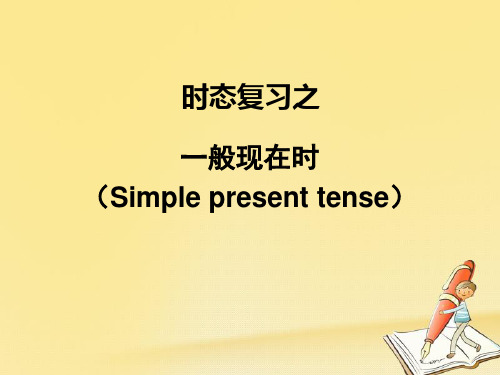
flies studies has teaches
don't watch
doesn't ride
shines teaches has
read
考点2 考查有关一般现在时句子的句型转换 【例2】按要求改写下列句子。
1. Lucy and Lily usually go home together. (改为否定句) _L_u_c_y_a_n_d__L_ily__d_o_n_'t__u_su_a_l_ly__g_o_h_o_m__e_t_o_g_e_t_h_e_r.___ 2. Mike often reads English in the morning. (改为一般 疑问句) __D_o_e_s_M__ik_e__o_ft_e_n_r_e_a_d__En__gl_is_h__in__th_e__m_o_r_n_i_n_g_?__ 3.We go swimming in summer. (就画线部分提问) _W__h_a_t_d_o__yo_u__d_o__in_s_u_m__m__er_?_________________
Practice and Test
3. --What __is__ your phone number?
--It __is___284-2942.
4. -- __A_r_e__ you Lucy?
-- No, I _a_m___ Lily.
5. Her brother’ )8. I ____ apples and she ____ pears.
A. like; like B. like; likes C. likes; likes
三、用所给单词的适当形式填空。 1. My father __i_s__(be) at home today. 2. Jane and Joe __a_re__(be) students. They __a_re__(be)
小升初总复习—时态(课件)人教PEP版英语六年级下册

如:go-going
2.以不发音的e结尾,去e加ing, 如:dance— dancing
3.重读闭音节中,以辅元辅结尾,双写末尾的辅音 字母,再加ing
如:run-running, stop-stopping
一、写出下列动词的现在分词: run_______ swim _______ make______ begin_____ go________ like________ write______ shop ______ have ______ sing ______ dance ______ put________ see_______ love_______ live_______ take_______ come _____ get _______
7. He _r_e_a_d__(read) a book last night.
练习
1. It _w_a_s_ (be) Mike’s birthday last Friday. 2. We all __h_ad_ (have) a good time last night. 3. She _r_e_a_d_a book yesterday. (read) 4. Jim didn’tg_o___(go) home yesterday. 5. I didn’t _f_e_e_l ( feel ) very well yesterday .
2. She __(buys / bought ) a new book yesterday.
3. Jim __w_a_s__ (be)very happy last night
4. She _g_o_e_s_(go) to school at 7:00 every day. 5. Yesterday she _w_e_n_t( go) to school at7:20. 6. I s_t_u_d_i_e(dstudy) English at home yesterday.
2.以不发音的e结尾,去e加ing, 如:dance— dancing
3.重读闭音节中,以辅元辅结尾,双写末尾的辅音 字母,再加ing
如:run-running, stop-stopping
一、写出下列动词的现在分词: run_______ swim _______ make______ begin_____ go________ like________ write______ shop ______ have ______ sing ______ dance ______ put________ see_______ love_______ live_______ take_______ come _____ get _______
7. He _r_e_a_d__(read) a book last night.
练习
1. It _w_a_s_ (be) Mike’s birthday last Friday. 2. We all __h_ad_ (have) a good time last night. 3. She _r_e_a_d_a book yesterday. (read) 4. Jim didn’tg_o___(go) home yesterday. 5. I didn’t _f_e_e_l ( feel ) very well yesterday .
2. She __(buys / bought ) a new book yesterday.
3. Jim __w_a_s__ (be)very happy last night
4. She _g_o_e_s_(go) to school at 7:00 every day. 5. Yesterday she _w_e_n_t( go) to school at7:20. 6. I s_t_u_d_i_e(dstudy) English at home yesterday.
时态之一般过去时(课件)人教PEP版英语六年级下册

一般过去时
1. 用法:表示在过去的某个时间里发生的动作或存在的状态。
例:I went to the zoo last weekend.
He was a teacher ten years ago.
2.标志时间词:
yesterday(昨天)yesterday+时间, last+时间词(上一个……)
时间+ago(……以前)
live—lived
close—closed
遇y结尾记得 往前看一看
(3)以辅音字母加y结尾的动词,改y为i,再加ed。
cry—cried
study—studied
3. 动词过去式的变化规则
(4)辅元辅+重读闭音节结尾,先双写最后这个辅音字 母,再加ed。
stop—stopped drop—dropped
In the afternoon, I went shopping with my friend. I bought a book about animals. I gave the book to my daughter(我的女儿). I had a happy time on the weekend.
三、按要求完成下列句子。 1.I had a cold last week.(改为一般疑问句,并作肯定回答) —_D_i_d_y_o_u__h_a_v_e_a__c_o_ld__la_s_t_w__e_e_k_?_____ —__Y_e_s_,I_d_i_d_.______________________ 2.We bought some clothes last month .(改为一般疑问句,
1. 发生的时间:When 什么时候__L_a_st_S_u_n_d_a_y______
人教版(PEP)六年级下册英语Recycle 时态复习课件(共19张PPT)
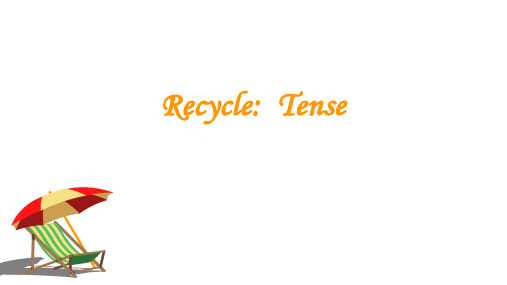
过去式
study-studied stop- stopped play- played like- liked do- did have-had see- saw go- went
用所给动词的适当形式填空。
1. Five years ago, Mary ____c_o_u_ld__ ( can) draw and read.
(The Simple Past Tense)
作或存在的状态。
各时态常用的信息词
一般现在时: always, usually, often, sometimes , every day, every…
一般过去时:
last night, last…, two days ago, …ago, yesterday in 1999, in +过去的年份,
一般将来时: 将要发生的动作或存在的状态及打算、 计划或准备做某事。
时态常用的信息词
tomorrow, next day (week, month, year…)
谓语基本结构 1. be going to + do 2. will+ do
be going to = will 如:
I am going to go swimming tomorrow.
3. Jane and Peter ___a_r_e_g_oi_n_g_t_o_ta_k_e__ (take)
photos tomorrow.
will take
一般现在时: 经常或习惯性的动作或存
(The Simple
Present Tense)
过去某个时间或时间段发生的动
Recycle: Tense
现在进行时: 正在发生的动作或存在的状态
六年级下册英语总复习课件第4章 时态解析 第一节 一般现在时|人教(PEP) (共15张PPT)

一般现在时表示通常性、规律性或习惯性的状态或 动作,常和always,often,never,every day, sometimes等表示频度的时间状语连用。
1.一般现在时由动词原形和动词的第三人称单数形式 构成,具体形式如下表所示:
类别
形式
例句
第一人称单数+ am
I'm a student.我是个学生。
+动词第三人 /她在学校工作。
实义动 词的
称 单数形式
一般现 在时
第一、二人称 单数/人称复数
It looks like a hat.它看起 来像一顶帽子。 I/You like English very much.我/你非常喜欢英语。 We/You/They watch TV every
+动词原形 night.我们/你们/他们每晚看
1.一般疑问句及其回答 谓语是be动词,时把be动词放到主语前面,肯定回答为: Yes,主语+be动词;否定回答为:No,主语+be动词 +not。谓语是实义动词原形时,在主语前加do,肯定 回答为:Yes,主语+do;否定回答为:No,主语+ don't。谓语是实义动词的第三人称单数时,在主语前 加does,谓语动词还原成动词原形,肯定回答为:Yes, 主语+does;否定回答为:No,主语+doesn't。疑问 句句末用“?”结尾。如: She is a worker.她是一名工人。 —Is she a worker?她是一名工人吗? —Yes,she is./No,she isn't.是的,她是。/不,她 不是。
13、He who seize the right moment, is the right man.谁把握机遇,谁就心想事成。2021/8/262021/8/262021/8/262021/8/268/26/2021 •14、谁要是自己还没有发展培养和教育好,他就不能发展培养和教育别人。2021年8月26日星期四2021/8/262021/8/262021/8/26 •15、一年之计,莫如树谷;十年之计,莫如树木;终身之计,莫如树人。2021年8月2021/8/262021/8/262021/8/268/26/2021 •16、教学的目的是培养学生自己学习,自己研究,用自己的头脑来想,用自己的眼睛看,用自己的手来做这种精神。2021/8/262021/8/26August 26, 2021 •17、儿童是中心,教育的措施便围绕他们而组织起来。2021/8/262021/8/262021/8/262021/8/26
1.一般现在时由动词原形和动词的第三人称单数形式 构成,具体形式如下表所示:
类别
形式
例句
第一人称单数+ am
I'm a student.我是个学生。
+动词第三人 /她在学校工作。
实义动 词的
称 单数形式
一般现 在时
第一、二人称 单数/人称复数
It looks like a hat.它看起 来像一顶帽子。 I/You like English very much.我/你非常喜欢英语。 We/You/They watch TV every
+动词原形 night.我们/你们/他们每晚看
1.一般疑问句及其回答 谓语是be动词,时把be动词放到主语前面,肯定回答为: Yes,主语+be动词;否定回答为:No,主语+be动词 +not。谓语是实义动词原形时,在主语前加do,肯定 回答为:Yes,主语+do;否定回答为:No,主语+ don't。谓语是实义动词的第三人称单数时,在主语前 加does,谓语动词还原成动词原形,肯定回答为:Yes, 主语+does;否定回答为:No,主语+doesn't。疑问 句句末用“?”结尾。如: She is a worker.她是一名工人。 —Is she a worker?她是一名工人吗? —Yes,she is./No,she isn't.是的,她是。/不,她 不是。
13、He who seize the right moment, is the right man.谁把握机遇,谁就心想事成。2021/8/262021/8/262021/8/262021/8/268/26/2021 •14、谁要是自己还没有发展培养和教育好,他就不能发展培养和教育别人。2021年8月26日星期四2021/8/262021/8/262021/8/26 •15、一年之计,莫如树谷;十年之计,莫如树木;终身之计,莫如树人。2021年8月2021/8/262021/8/262021/8/268/26/2021 •16、教学的目的是培养学生自己学习,自己研究,用自己的头脑来想,用自己的眼睛看,用自己的手来做这种精神。2021/8/262021/8/26August 26, 2021 •17、儿童是中心,教育的措施便围绕他们而组织起来。2021/8/262021/8/262021/8/262021/8/26
小学英语时态总复习(课件)度人教版PEP版英语六年级下册
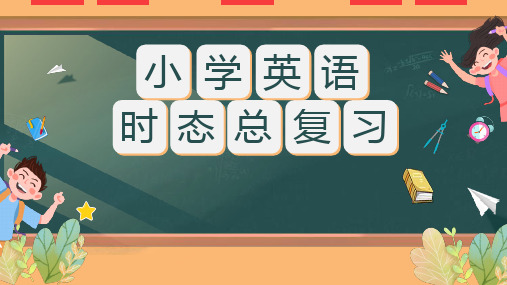
No, I didn’t.
When did you clean the classroom?
yesterday
给对应的时态找到时间伙伴
用动词的正确形式填空 1. she __d_o_e_s_ (do) her homework every evening. 2. We ___f_l_y__ (fly) kites in the park on Sundays. 3. My mother __c_le_a_n_e_d_ (clean) our room last Sunday. 4. Tom __p__la_y_s_(play) the piano every Saturday. Now he_i_s_p_la_y_ing(play). 5. She __l_ik_e_s__(like) swimming. She i_s g_o_in_g_to__sw_im_(swim) next weekend. 6. Usually my mother _w_a_s_h_e_s_ (wash) the dishes after lunch. But my grandma_w_a_s_h_e_d_ (wash) yesterday. 7. Look at the man! He __is_r_e_a_d_i_n_g__ (read) a magazine. 8. _D__id_ (do)you__d_o(do)homework last weekend?
习惯性的 动作
爱好
Tip
经常发生
现在进行时态 表示正在发生的动作, 常与表示现在的时间 now, listen, look 连用
结构:
问:What+be动词+主语+doing? 答:主语+be动词+动词ing形式。 如:——What are you doing?
When did you clean the classroom?
yesterday
给对应的时态找到时间伙伴
用动词的正确形式填空 1. she __d_o_e_s_ (do) her homework every evening. 2. We ___f_l_y__ (fly) kites in the park on Sundays. 3. My mother __c_le_a_n_e_d_ (clean) our room last Sunday. 4. Tom __p__la_y_s_(play) the piano every Saturday. Now he_i_s_p_la_y_ing(play). 5. She __l_ik_e_s__(like) swimming. She i_s g_o_in_g_to__sw_im_(swim) next weekend. 6. Usually my mother _w_a_s_h_e_s_ (wash) the dishes after lunch. But my grandma_w_a_s_h_e_d_ (wash) yesterday. 7. Look at the man! He __is_r_e_a_d_i_n_g__ (read) a magazine. 8. _D__id_ (do)you__d_o(do)homework last weekend?
习惯性的 动作
爱好
Tip
经常发生
现在进行时态 表示正在发生的动作, 常与表示现在的时间 now, listen, look 连用
结构:
问:What+be动词+主语+doing? 答:主语+be动词+动词ing形式。 如:——What are you doing?
时态之现在进行时(课件)人教PEP版英语六年级下册

过关检测
一、写出下列动词的现在分词形式。
1. play __p_la_y_in_g__
2. look _l_o_o_ki_n_g__
3. study _s_t_u_d_yi_n_g_ 5. fight _f_ig_h_t_in_g__
4. watch _w_a_t_ch_i_n_g_ 6. wait _w__ai_t_in_g__
Thank you
五、汉译英。
1.汤姆正在写一封信。 __T_o_m__is__w_r_it_i_n_g_a__le_t_te_r_._________________ 2.我正在游泳。 __I_'m__s_w_i_m_m__i_n_g_. _______________________ 3.他们正在听音乐。 __T_h_e_y_a_r_e__li_st_e_n_i_n_g_t_o_m__u_s_ic_._____________ 4.看!小猫正在跑。 __T_h_e__ca_t_i_s_r_u_n_n_i_n_g_. ____________________ 5.妈妈正在书房看书。 __M__y_m__o_t_h_e_r _is__re_a_d_i_n_g_a__b_o_o_k_. ___________
Where is Uncle Wang drinking tea?
→
结构: be+doing ( be要根据主语作人称和数的变化) 句型转换
1.肯定句转换成否定句,要在 be 后加 not 构成 eg: We are reading English now.
We are not reading English now.
( B )(3) they
their stamps at the corner?
(整理)pep六年级英语时态复习.ppt
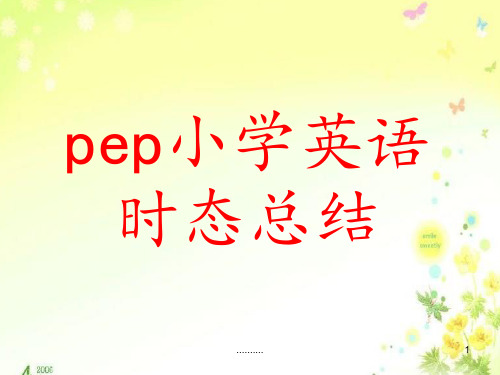
pep小学英语 时态总结
..........
1
定义:表示现在正在发生的事情。 时间关键词:now/ Listen!/ Look! 构成方式:主语+be+动-ing
..........
2
1. 直接加ing: do—doing read—reading sing—singing
draw—drawing cook—cooking listen—listening fly—flying play—playing
你将要买什么呢?
What are you going to buy? I’m going to buy a comic book.
你将和谁一起去?
Who are you going with?
I’m going with my pa.r...e....n.. ts.
11
选择填空。
( C )1. We are going to _______ kites.
一般将来时 主语+be going to +动词原形
..........
13
动词的过去式的构成规则有:
1.直接加ed: work—— worked ,look——looked ,play——played, 2.以e结尾的单词,直接加d:live ——lived use——used, 3.以辅音字母+y结尾的,变y为i加ed:study—— studied
play——played 不规则动词(此类词并无规则,须熟记)
sing – sang , eat – ate ,see – saw , have – had , do – did ,
go – went , take – took , buy – bought , get – got , read – read ,
..........
1
定义:表示现在正在发生的事情。 时间关键词:now/ Listen!/ Look! 构成方式:主语+be+动-ing
..........
2
1. 直接加ing: do—doing read—reading sing—singing
draw—drawing cook—cooking listen—listening fly—flying play—playing
你将要买什么呢?
What are you going to buy? I’m going to buy a comic book.
你将和谁一起去?
Who are you going with?
I’m going with my pa.r...e....n.. ts.
11
选择填空。
( C )1. We are going to _______ kites.
一般将来时 主语+be going to +动词原形
..........
13
动词的过去式的构成规则有:
1.直接加ed: work—— worked ,look——looked ,play——played, 2.以e结尾的单词,直接加d:live ——lived use——used, 3.以辅音字母+y结尾的,变y为i加ed:study—— studied
play——played 不规则动词(此类词并无规则,须熟记)
sing – sang , eat – ate ,see – saw , have – had , do – did ,
go – went , take – took , buy – bought , get – got , read – read ,
小升初必会四大时态(课件)人教PEP版英语六年级下册

2. have __h_a_d__
8. cook __co_o_k_e_d__
3. sleep__s_le_p_t_
9. clean __c_le_a_n_
4. read __r_e_a_d_
10. watch __w_a_tc_h_ed
5. make__m_a_d_e_
11. are __w__er_e_
一般过去时—— Exercises
一、写出下列单词的过去单三形式。
1. go _g_o_e_s
7. clean _cl_e_a_ns__
2. have __h_a_s__
8. walk __w_a_lk_s___
3. do_d_o_e_s__
9. work_w_o_r_k_s_
4.like__li_k_e_s_
3. 无明显时间词,默认为一般现在时
一般过去时—— Grammar
单三有哪些?
①人称代词he, she, it ②指示代词this, that ③人名、地名 ④可数名词单数、不可数
动词单三变化规则:
①一般直接+s ②以s/x/sh/ch/o结尾+es ③以辅音字母+y结尾,变y为i+es ④have变has
动词过去式变化规则:
1. 直接+ed 2. 不发音 e 结尾,直接+d 3. 辅音字母+y 结尾,变 y为 i +ed 4. 双写+ed: trip, plan, stop 5. 不规则变化:课本 P69
一般过去时—— Exercises
一、写出下列单词的过去式。
1. see _s_a_w_
7. wash _w_a_sh_e_d_
人教版(PEP)英语六年级下册一般现在时课件

watch do wash
V三
works lives runs
规则
1.一样情形 -s
watches does washes
2. 以s,x,o,sh,ch 结尾 -es
动词变单三情势
1. 变形规则
2. 肯定句 3. 否定句 4. 一样疑问句 5. 特别疑问句
What’s the rule?
V原
study fly
here, but I am learning to ski. It's really interesting.
Please write to me soon.
Yours, Daniel
(1)Why does Daniel call it white Christmas?
It’s snowy on Christmas.
3.We have English class on Monday. _W__h_e_n_d_o__y_o_u__h_a_v_e_E_n__g_li_sh__c_la__ss_?_________
4.Li Tao usually runs in the park . _W__h_e_r_e_d_o_e_s_L__i _T_a_o_r_u_n__?________________
lunch
do homework
go to bed
get up breakfast go to school have…class lunch do homework go to bed
➢ I go to school on foot everyday.
get up
breakfast
go to school have class lunch
V三
works lives runs
规则
1.一样情形 -s
watches does washes
2. 以s,x,o,sh,ch 结尾 -es
动词变单三情势
1. 变形规则
2. 肯定句 3. 否定句 4. 一样疑问句 5. 特别疑问句
What’s the rule?
V原
study fly
here, but I am learning to ski. It's really interesting.
Please write to me soon.
Yours, Daniel
(1)Why does Daniel call it white Christmas?
It’s snowy on Christmas.
3.We have English class on Monday. _W__h_e_n_d_o__y_o_u__h_a_v_e_E_n__g_li_sh__c_la__ss_?_________
4.Li Tao usually runs in the park . _W__h_e_r_e_d_o_e_s_L__i _T_a_o_r_u_n__?________________
lunch
do homework
go to bed
get up breakfast go to school have…class lunch do homework go to bed
➢ I go to school on foot everyday.
get up
breakfast
go to school have class lunch
人教PEP版英语六年级下册一般现在时(课件)

5. They __h_a_v_e__ (have) the same hobby.
6. My aunt __lo_o_k_s__ (look) after her baby carefully.
7. You always ___d_o__ (do) your homework well.
8. She __g_o_e_s__ (go) to school from Monday to Friday.
四大时态
我现在在写数学作业。
现在进行时
我昨晚在写数学作业。
一般过去时
我今晚要写数学作业。
一般将来时
一般现在时 我每天晚上都要写数学作业。
一般现在时
now
定义
定义
表示经常性、习惯school by bus. He often goes swimming in summer.
一般现在时定义
1、表示经常性、习惯性的动作。 2、表示事物或人物的特征、状态、爱好。 3、表示客观现实或者永恒不变的真理。
标志词
总是
always
通常
usually
经常
often
有时候
sometimes
从不
never
标志词
every 每一个
day 天 week 周 month 月 year 年 morning 早上 afternoon 下午 evening 晚上
Exercises
2. The girl __te_a_c_h_e_s_ (teach) us English on Sundays.
3. She and I ___t_a_ke___ (take) a walk together every evening.
2022春六年级英语下册时态课件人教PEP版

He isn’t going to/won’t play ping-pong tomorrow. 他明天不会去打乒乓球。
第十二页,编辑于星期六:三点 四十分。
3.一般疑问句:Be 动词+主语+going to+动词原形+其 他?/Will+主语+动词原形+其他?
Is he going to play ping-pong tomorrow?/Will he play ping-pong tomorrow?
第十一页,编辑于星期六:三点 四十分。
(三)各种句式 1.肯定句:主语+be going to(will)+动词原形+其他.
He is going to/will play ping-pong tomorrow. 他明天要去打乒乓球。
2.否定句:主语+be not going to/won’t+动词原形+其他.
What does she do every day? 她每天做什么?
第十页,编辑于星期六:三点 四十分。
三、一般将来时 一般将来时表示将要发生的动作或事情。
(一)结构:主语+be going to(will)+动词原形。 (二)时间状语有:tomorrow,next year/Monday/week, this morning/afternoon...
他明天会去打乒乓球吗? 4.特殊疑问句:特殊疑问词+be动词+主语+going to+动 词原形+其他?/特殊疑问词+will+主语+动词原形+其他?
What are you going to do tomorrow?/What will you do tomorrow?
第十二页,编辑于星期六:三点 四十分。
3.一般疑问句:Be 动词+主语+going to+动词原形+其 他?/Will+主语+动词原形+其他?
Is he going to play ping-pong tomorrow?/Will he play ping-pong tomorrow?
第十一页,编辑于星期六:三点 四十分。
(三)各种句式 1.肯定句:主语+be going to(will)+动词原形+其他.
He is going to/will play ping-pong tomorrow. 他明天要去打乒乓球。
2.否定句:主语+be not going to/won’t+动词原形+其他.
What does she do every day? 她每天做什么?
第十页,编辑于星期六:三点 四十分。
三、一般将来时 一般将来时表示将要发生的动作或事情。
(一)结构:主语+be going to(will)+动词原形。 (二)时间状语有:tomorrow,next year/Monday/week, this morning/afternoon...
他明天会去打乒乓球吗? 4.特殊疑问句:特殊疑问词+be动词+主语+going to+动 词原形+其他?/特殊疑问词+will+主语+动词原形+其他?
What are you going to do tomorrow?/What will you do tomorrow?
六年级下册英语PPT课件-小升初语法复习—时态 人教PEP版

一般现在时 正在进行时 一般将来时 一般过去时
PART ONE
一般现在时
概念
一般现在时表示经常性或习惯性的动作。 I get up at six every day.
We study English.
Mary likes Chinese.
一般现在时的构成
1.由be动词构成 主语+be(am,is,are)+其他.如: I am a girl.我是一个女孩。
标志词
last weekend last night last Monday yesterday the day before yesterday
课堂问答
单击此处添加您的文字内容,或复制文本粘贴至此
She _____ (like) music.Now she _____ (sing). Bob _______(like) cooking. My mother _________________ (cook)some food now. They _______(have) the same hobby. My sister _______(look) after her baby carefully. The boy __________________ (draw)a picture now You always _______(do) your homework well. Mary ________ (visit) her grandparents tomorrow. We ________ students three years ago. Ling Ling ________ eleven years old last year.
6.在中国,人工智能已被纳入国家科 研计划 。
[新版]pep六年级英语时态.ppt
![[新版]pep六年级英语时态.ppt](https://img.taocdn.com/s3/m/b2a54dbfee06eff9aef807ee.png)
你将要买什么呢?
What are you going to buy? I’m going to buy a comic book.
你将和谁一起去?
Who are you going with?
I’m going with my pa精r品e文n档ts.
11
选择填空。
( C )1. We are going to _______ kites.
精品文档
2
1. 直接加ing: do—doing read—reading sing—singing
draw—drawing cook—cooking listen—listening fly—flying play—playing
2. 去掉末尾的e加ing:
write—writing
dance—dancing
tonight, this weekend, next week, next month,
next year, next weekend.
主要问答句 (今晚)你将要做什么? What are you going to do (this evening)? I’m going to visit my grandparents.
He likes drawing pictures. She works in a factory. It has a long nose. My father goes to work on foot. Li Lei often plays computer games after lunch.
6. 一般疑问句记住: 前面助动词加了es,后面动词就不变化了。例如: Does she do word puzzles every day?
- 1、下载文档前请自行甄别文档内容的完整性,平台不提供额外的编辑、内容补充、找答案等附加服务。
- 2、"仅部分预览"的文档,不可在线预览部分如存在完整性等问题,可反馈申请退款(可完整预览的文档不适用该条件!)。
- 3、如文档侵犯您的权益,请联系客服反馈,我们会尽快为您处理(人工客服工作时间:9:00-18:30)。
sing – sang , eat – ate ,see – saw , have – had , do – did ,
go – went , take – took , buy – bought , get – got , read – read ,
fly – flew , am/is – was ,are – were , make – made , fall– fell , can – could ,sit – sat ,hurt – hurt , run----ran
2. 去掉末尾的e加ing:
write—writing
dance—dancing
have—having
make—making
take—taking ride—riding
3. 双写末尾字母ing :
get—getting run—running
sit—sitting
put—精p品u文t档ting
swim—swimming
The children ___a_re___ _p_la_y_i_n_g_ _fo_o_t_b_a_ll_ in the
playground.
精品文档
5
定义:表示现在的状态,经常的或习惯性的动作。
时间关键词: usually/ sometimes/often / always/ every词组/
3. 辅音字母+y结尾的把y变i再加es,如: fly—flies;study—studies
4. 特殊情况:have—has
精品文档
7
5. 第三人称单数主语包括:he; she; it; my father/friend Amy/Hangzhou等一个人名或地名。 例如:
He likes drawing pictures. She works in a factory. It has a long nose. My father goes to work on foot. Li Lei often plays computer games after lunch.
精品文档
9
表示一般将来时的时间状语有:
this morning, this afternoon, this evening, tomorrow,
tonight, this weekend, next week, next month,
next year, next weekend.
主要问答句 (今晚)你将要做什么? What are you going to do (this evening)? I’m going to visit my grandparents.
A. flies B. flying C. fly
( A )2. I am going to _______ a teacher.
A. be
B. is
C. am
精品文档
12
时态
构成形式
现在进行时 主语+be+动-ing(现在分词)
一般现在时
①非三单+动词原形 ②三单+动词第三人称单数形式
一般将来时 主语+be going to +动词原形
pep小学英语 时态总结
精品文档
1
定义:表示现在正在发生的事情。 时间关键词:now/ Listen!/ Look! 构成方式:主语+be+动-ing
精品文档
2
1. 直接加ing: do—doing read—reading sing—singing
draw—drawing cook—cooking listen—listening fly—flying play—playing
3
主要问答句
你正在干什么? What are you doing? I’m answering the phone.
他/她/它正在干什么? What is he/she/it doing? He’s/She’s/It’s …
他(她、它)们正在干什么? What are they doing? They are …
你将什么时候去?
When are you going?
I’m going at 7:10.
精品文档
10
你将怎样去呢?
How are you going? I’m going by bus.
今天下午你将要去哪里?
Where are you going this afternoon? I’m going to the bookstore.
构成方式:①非三单+动词原形 ②三单+动词单三
精品文档
6
1. 一般情况加s,如: read—reads;live—lives;play—plays;sing—sings
2. 动词末尾以s,x,ch,sh或部分以o结尾的加es。 watches, teaches, goes, does, washes
精品文档
13
动词的过去式的构成规则有:
1.直接加ed: work—— worked ,look——looked ,play——played, 2.以e结尾的单词,直接加d:live ——lived use——used, 3.以辅音字母+y结尾的,变y为i加ed:study—— studied
play——played 不规则动词(此类词并无规则,须熟记)
你将要买什么呢?
What are you going to buy? I’m going to buy a comic book.
你将和谁一起去?
Who are you going with?
I’m going with my pa精r品e文n档ts.
11
选择填空。
( C )1. We are going to _______ kites.
精品文档
4
Ⅱ. 汉译英,每空一词。来自1. 我正在看电视。 I ___a_m__ ____w__a__tc__h_i_n_g__TV.
2. 刘涛的父亲正在浇花。
Liu Tao’s father _i_s_____w__a_t_e_r_i_n_g____f_l_o_w__e_r_s___.
3. 孩子们正在操场上踢足球.
6. 一般疑问句记住: 前面助动词加了es,后面动词就不变化了。例如: Does she do word puzzles every day?
Does your pen pal live in Hangzhou?
精品文档
8
定义:表示将来发生的动作或情况。 时间关键词:tomorrow/ next等 构成方式:主语+be going to +动词原形
